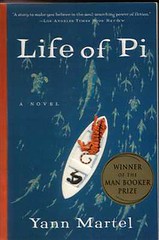Life of Pi—Yann Martel
July 20, 2006 on 9:23 pm | In 书斋札记 | 4 Comments挺久时间没读长篇的英文小说了,终于在图书馆的一封催书通知下,把借回来搁置了很久的加拿大作家Yann Martel的Life of Pi读完了。这本荣获加拿大2002 Man Booker Prize的小说,是作者Yann Martel的第二部作品。故事的主人公Pi Patel是一个动物园园主的儿子,从小生活在印度的Pondicherry,在那里他尝试了不同的宗教信仰,不可思议的同时成为了印度教、基督教和伊斯兰教的教徒。在他十六岁那年,因为印度国内的政治变动,Patel全家决定移民加拿大。在关闭动物园之后,Pi的父亲将其中一些动物装在铁笼里一并带上了载他们驶往加拿大的货轮。在太平洋航行的途中,货轮发生了可怕的沉船事件,一片混乱之后,Pi发现自己和一匹腿受了伤的斑马、一只凶残的土狼、一只晕船的猩猩和一头孟加拉猛虎共处一条救生艇中。受伤的斑马和晕船的猩猩相继成了土狼的食物,接着孟加拉虎撕食了土狼,几天之后,艇上只剩下了Pi和450磅重的孟加拉虎Richard Parker。在二百多天漂流的日子里,Pi凭借从父亲处学到的驯养动物的技巧,和Richard Parker在救生艇的一隅之地成为互不侵犯的邻居,和平共处,并且依靠自己的智慧和顽强不懈的求生本能,与饥渴、鲨鱼、海浪、风暴做殊死的斗争。小说的描写充满想象力,少年Pi所经历的各种磨难,如一波波迭起的潮水,刺激着读者的阅读神经,而中间短暂的平静,无论是白日里的碧空无云,还是黑夜星空的冰凉静谧,都使人在紧张的“劫难”后暂时感受一点舒缓的诗意之美。虽然中间还是有一些比较大段冗长的叙述,让人读得有点索然,不过作者很好的把握住这急缓之间的变奏,在即将昏昏欲睡的那刻,来一支强心针,掀起一个小高潮,将读者重新拉回到惊心动魄的生死漂流中。由此可见,作者的叙事功力实非一般。
在小说的结尾,作者玩了一个不小的trick,可能会让一些寻求真相的读者既爱又恨。Pi在墨西哥被获救,日本海运交通科派了两个人来向Pi询问大半年前的那次沉船事故,可惜他们无论如何都不相信Pi可以在和一头猛虎的共处中存活下来的故事。于是,在调查人员的一再追问下,Pi讲述了另外一个版本的故事:遇难后,逃到救生艇上的是一名腿骨折的海员(斑马)、货轮上脾气暴躁的厨师(土狼)、Pi的母亲(猩猩)和Pi(孟加拉虎),四个人之间发生了斑马、土狼、猩猩和虎的故事,最后只有Pi活了下来。可惜这两个版本的故事,都帮助不了海运科的人了解事故的原因,既然如此,Pi便问两个日本人,Which is the better story, the story with animals or the story without animal? 最后的船难报告选择了the story with animals is the better one。
书的扉页上写着一句话:小说讲的这个罕见的奇迹般的故事,也许会使你相信上帝的存在。我不太明白,难道是因为Pi特别的宗教热情吗?肯定不止这样,虽然我还不知道“这样”的以外是什么,也许是因为我从来没去想过有没有上帝这回事吧。不过,小说结尾那个which is the better story的提问,真让我觉得很有意思。小说是虚构的文学创作,在这个借想象构成的世界里,人和人的故事、还是人和动物的故事,我们更喜欢哪个?更愿意相信哪个呢?至于写故事的,到底是人,还是上帝?

4 Comments »
RSS feed for comments on this post.
Leave a comment
Powered by WordPress with theme based on Pool theme design by Borja Fernandez.
Entries and comments feeds.
Valid XHTML and CSS. ^Top^
can i ask some questions about this novel?
because i am a little bit confused with some questions.
why pi tells tow different stories to the Japanese transportminister?
i think the tiger stands for the deadly situations in our life.but why author chose a hyena and an orang-utan as the other animals on the boat?
you can contact by email.either chinese or english is ok
Comment by fay — October 30, 2006 11:13 am GMT-0700 #
because the Japanese men didn’t believe the Pi’s story of survival with a tiger on the boat at all, and, time and again, pushed Pi to tell them what on earth happened, so Pi invented another version of the story.
But in fact, for the readers, as well as for the japanese men, we cannot determine what was really happening, either, therefore, Pi’s question is also applied to us, which one do we think is better, or more inclined to believe?
In some sense, it’s a trick played by the author, maybe would inspire a lot of further discussion.
as for the other animals in the novel, they may have some different symbolic meanings, other than the tiger, I think.
Comment by Lilyppbb — October 30, 2006 4:18 pm GMT-0700 #
Good Book
Comment by SMile — January 9, 2007 3:00 pm GMT-0700 #
我也很爱这本书!
超爱那英文版的!
Comment by Lucy — March 24, 2008 8:56 am GMT-0700 #